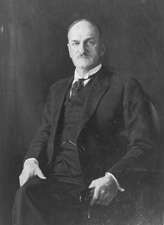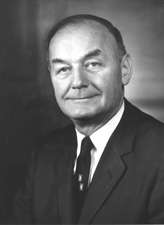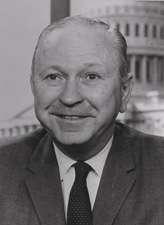Republican State Committee of Delaware
The Republican State Committee of Delaware is the affiliate of the United States Republican Party (GOP) in Delaware. Developed during the Civil War era, the GOP of Delaware remains one of the two biggest parties in Delaware. Famous Americans such as Governor and Congressman Mike Castle, Governor and former Presidential candidate Pete du Pont, Thomas Coleman Dupont, John Williams, and J. Caleb Boggs all made their claim of fame serving the Republican Party in various state and federal positions. As of October 2017, its headquarters is located at 3408A Lancaster Pike, Wilmington,De19805. Contact number is 302-668-1954.
Republican State Committee of Delaware | |
|---|---|
 | |
| Chairperson | Jane Brady |
| Senate Minority Leader | Gerald Hocker |
| House Minority Leader | Daniel Short |
| Headquarters | 3408-A Lancaster Avenue Wilmington, Delaware 19805 |
| Ideology | Conservatism Fiscal conservatism Social conservatism |
| Political position | Center-right |
| National affiliation | Republican Party |
| Colors | Red |
| Delaware Senate | 9 / 21 |
| Delaware House of Representatives | 15 / 41 |
| Statewide Executive Offices | 0 / 6 |
| United States Senate | 0 / 2 |
| United States House of Representatives | 0 / 1 |
| County Councils | 8 / 24 |
| Website | |
| www.delawaregop.com www.facebook.com/DelawareRepublicanParty | |
The 2017 Republican State Committee Convention was held April 28–29 at Dover Downs Hotel and Casino in Dover, Delaware.
The Delaware Republican State Committee elected businessman and former Kent County Trump Campaign Chairman, Micheal J. Harrington, as the Chairman of the Delaware Republican Party.
In addition, 29-year-old and former Delaware Federation of College Republicans Chairwoman, Emily Taylor, defeated favorite former U.S Senate candidate Kevin Wade, 149-102 votes and was elected Vice-Chairwoman of the Delaware Republican Party. Taylor is the youngest to ever be elected to Delaware Republican Party leadership and is one of the youngest elected party GOP official in the United States.
Carol Bodine was re-elected as Secretary, and former Delaware House of Representatives candidate Dennis Cini was unanimously voted in as Treasurer.[1] As a party representing the three counties of Delaware, the party also has offices in other parts of the state as well. These regional offices are located in Dover, Newark, North Wilmington and Georgetown.[2]
History of the party
Beginning
The Republican State Committee of Delaware got its start in the mid-1800s when the American Party (a group dedicated to prohibition of alcohol), People's Party, and former Whigs reformed under the Union Party. This party was dedicated to preserve the Union in the time of Lincoln's election. While Delaware did not secede from the Union, Delaware Democrats and other supporters often opposed Lincoln's policies.[3] The Republican party struggled to gain control in the state from 1865 to 1898 with the Democratic Party maintaining control of both the federal and state level of government. However, changes in industry and the arrival of immigrants in key locations would soon spell the rise of the Republican party in Delaware.
The RSC's first rise to prominence
With industry and business slowly overtaking agriculture in the state, the Republican Party in Delaware began to develop the support it needed to overthrow the long incumbent Democratic Party. However, the rise of the party was not complete without some controversial actions. As it was common in the era, the late 1800s was rife with voter corruption and illegal election techniques. One candidate, John Addicks, was infamous for attempting to buy a U.S. Senate seat by exploiting the rising party. Republicans in the state divided on the issue with Regular Republicans opposing Addicks while Union Republicans supported him.[3] Although Addicks didn't win election in 1899 or 1901, his corrupt tactics led to a vacation of the U.S. Senate seat for over ten years.[3] However, Addick's corruption proved to be only a small speed bump. With industry as a growing part of the Delaware economy, the Republican Party began to grow in popularity. With men such as Henry Du pont and T. Colemon Du pont (Both members of the famous industrial Du pont family) leading the way, the Republican Party quickly gained power in the state and various government positions.

By 1915, Republicans controlled the Delaware Senate by a margin of 12 to 5 and the House by 23 to 10.[3] Governors of the state remained Republican candidates from 1897 up until 1936. With the exception of ratifying the 19th Amendment on a state level (once the U.S. Constitution accepted it, then Delaware did as well), the Republican majority in both the federal and state level dominated legislation until the mid-1930s.
Trading time with the Democrats
The modern era of the Republican Party of Delaware has largely consisted of the party trading off stretches of dominance with the opposing Democratic Party. Since World War II, the Republican party of Delaware has had its time of prominence and powerlessness. A great example of this is displayed in the form of the "Big Three" of Delaware politics during the mid-1900s. Two Republicans, John Williams and J. Caleb Boggs, compromised 2/3 of the "Big Three" in Delaware politics.[3] Williams would end up serving in the U.S. Senate from 1946 to 1971 while Boggs won seven statewide elections consisting of governor, U.S. House of Representatives, and U.S. Senate from 1947 to 1973. While Boggs and Williams dominated the federal sector of politics in Delaware, the third member of the "Big Three", Elbert N. Carvel, controlled the state sector and served as governor on two separate terms. Even with two powerful political figures in office, Carvel and the Democratic party provided enough competition to eventually turn back control of the Federal sector over to the Democrats.

The control for the state of Delaware remains a similar battle today, with one party gaining control only to lose it to its opposition. From 1949 to 2008, the Republican party has held the position of Governor for 29 years compared to the 30 years held by Democrats.[3] Even more telling of this "time trading" is the governor position in recent years. Despite dominating the state Governor position from 1977 to 1993, the Republican Party has been unable to defeat its Democratic counterparts since then will all governor elections being won by Democrats since 1993. To this day, the Republican party remains gridlocked with the Democratic Party with neither side able to completely convert voters over to their side.

Policies
The Republican State Committee's official statement on their party's goal provides an all encompassing focus on both national and local issues. It states "The party's goal is to defend the principles of less government, more personal freedom and a strong national defense. Republicans believe that Delawareans do best when empowered to make decisions for themselves, and that businesses most need a fair, free and predictable regulatory framework in order to prosper and create jobs." [4] More detailed stances on policies are listed below.
National defense The RSC of Delaware believes in establishing peace through a strong defense. Strong homeland security, confronting terrorist and national threats, and maintaining a strong intelligence network all comprise this policy. The Republican Committee also believes in establishing international relations in the quest to establish peace. However, it also believes that the United States can and should act unilaterally when it deems necessary.[5]
Health care The party's stance on health care revolves around the concept of "common sense" health care. The party believes that a government health care program will negatively affect patient/doctor relations, reduce competition, and won't promote quality health care. Instead, the RSC believes that competition will lead to lower cost and higher quality care.[5]
Energy policies Energy independence is the major principal behind the party's policy. The Republican Committee of Delaware supports safe and affordable productions of energy that can be used to keep prices low and keep American running in a healthy fashion.[5]
Education America's future is another strong priority of the Delaware Republican Party. The party believes that "choice" in education and maintaining the quality of schools is a vital aspect of our society. Parents should have a choice in picking schools and the option to move their children to the system they believe will help them to succeed.[5]
Economy A free market economy is the basis of the Republican Committee of Delaware's platform. As one of the head industrial and corporate heavy states in America, it is important to avoid interventionist policies and let businesses grow in a health fashion. With sensible regulations and a free market system, the economy will be free to grow and provide a stable job basis for the state of Delaware.[5]
Party leadership
- State Chair: M. Jane Brady
- Vice Chair: Deborah Hudson
- Treasurer: Dennis Cini
- Secretary: Carol Bodine
- Executive Assistant: Paula Manolakos
- Young Republican Chair: Sam Chick
- College Republican Chair: Daniel Worthington
- Delaware Federation of Republican Women Chair: Cathy Watts
- National Committeeman: Laird Stabler
- National Committeewoman: Ellen Barrosse
Current elected officials
Members of Congress
U.S. Senate
- None
Both of Delaware's U.S. Senate seats have been held by Democrats since 2000. William Roth was the last Republican to represent Delaware in the U.S. Senate. First elected in 1970, Roth lost his bid for a sixth term in 2000 to Tom Carper who has held the seat since.
U.S. House of Representatives
- None
Delaware's lone congressional district has been held by Democrats since 2010. The last Republicans to represent Delaware in the House of Representatives was Mike Castle. First elected in 1992, Castle opted not to run for re-election in 2010, instead unsuccessfully running for the Republican nomination for U.S. Senate. Glen Urquhart ran as the Republican nominee for the House seat in the 2010 election and was subsequently defeated by Democratic challenger John Carney.
Statewide offices
- None
Delaware has not elected any GOP candidates to statewide office since 2014, when Tom Wagner was re-elected as state auditor and Ken Simpler was elected as state treasurer. In 2018, Wagner opted not to seek re-election to an eight term. In 2018 elections James Spadola ran as the Republican nominee for auditor and was subsequently defeated by Democratic challenger Kathy McGuiness while Simpler was defeated in his bid for a second term as treasurer by Democratic challenger Colleen Davis.
State legislative leaders
State Assembly
State Senators
In 2017, Republicans controlled ten State Senate seats .[6] State Senators must be citizens of the United State and have resided in Delaware for three years. Candidates must also have been a resident of their respective district for at least one year preceding their election. The age requirement to run for this elected seat is 27 years old. In 2016 young millennial and civil attorney, Anthony Delcollo defeated long time 26-year incumbent, President Pro-Tempore Patrica Blevins (D) by 206 votes and thinning the partisan margin in the Senate.
In 2018, Minority Whip Senator Greg Lavelle (R) lost his reelection bid to Senator Laura V. Sturgeon by a margin of 53% to 47%, widening the gap between Democrats and Republicans by an additional seat. Presently, Republicans have 9 seats in the Delaware State Senate to the Democrats’ 12 seats.
Senator F. Gary Simpson, the Senate GOP’s minority leader, retired before the 2018 elections. His seat was filled by Senator David Wilson.
- 5th Senate District: Cathy Cloutier
- 6th Senate District: Ernesto Lopez
- 7th Senate District: Anthony Delcollo
- 15th Senate District: David G. Lawson
- 16th Senate District: Colin Bonini
- 18th Senate District: David Wilson
- 19th Senate District: Brian Pettyjohn
- 20th Senate District: Gerald Hocker
- 21st Senate District: Bryant Richardson
State Representatives
As of 2019, Republicans controlled 15 of the 41 State Assembly seats.[7] Any candidate running for the House of Representatives must have lived in Delaware for three years and be a U.S. Citizen. The candidate must also live in the district at least one year prior to running for office and be at least 24 years of age.
- 9th Representative District: Kevin Hensley
- 11th Representative District: Jeffrey Spiegelman
- 20th Representative District: Stephen Smyk
- 21st Representative District: Mike Ramone
- 22nd Representative District: Mike Smith
- 30th Representative District: Bobby Outten
- 33rd Representative District: Harold Peterman
- 34th Representative District: Lyndon Yearick
- 35th Representative District: David Wilson
- 36th Representative District: Harvey R. Kenton
- 37th Representative District: Ruth Briggs King
- 38th Representative District: Ronald Gray
- 39th Representative District/Minority Leader: Danny Short
- 40th Representative District: Tim Dukes
- 41st Representative District: Richard Collins
Notable Delaware Republicans
See also
- Delaware State Capitol
- Delaware General Assembly
- Delaware House of Representatives
- Delaware Senate
References
- "Delaware GOP - Home". www.delawaregop.com. Retrieved 2015-10-14.
- http://www.delawaregop.com/index.cfm?ref=20300
- Boyer, William and Edward C. Ratledge. Delaware Politics and Government. Board of Regents of the University of Nebraska. 2009.
- "Republican Party of Delaware". Republican Party of Delaware Official Webpage. http://www.delawaregop.com/.
- "Issues". National GOP official web page. http://www.gop.com/index.php/issues/issues/
- Delaware State Senate Home,http://legis.delaware.gov/Legislature.nsf/Lookup/SenateHome?open&nav=senate, Accessed October 14th, 2015
- Delaware House of Representatives,http://legis.delaware.gov/Legislature.nsf/Lookup/House_Home?open&nav=house, accessed November 15th, 2011
External links
- Republican State Committee of Delaware
- Delaware State Senate official government website
- Delaware House of Representatives
- Republican National Committee — Official website